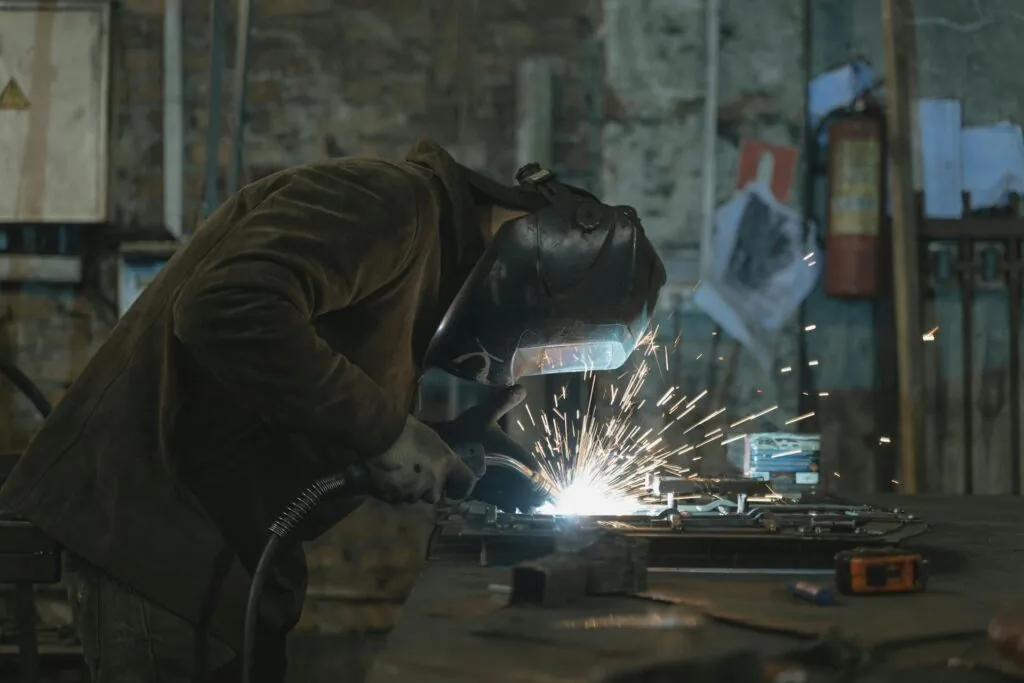Maritime Welding Accident Lawyers
Maritime welding is an essential yet inherently hazardous profession critical to the maintenance and construction of ships, offshore platforms, and other marine structures. This demanding job requires precision that exposes workers to significant risks, including burns, explosions, toxic fume inhalation, and electrical shocks. Accidents like equipment failure, inadequate safety protocols, or insufficient training can make this a truly perilous working environment.

Call us today at 832-844-6700 for a free case evaluation with an experienced Houston work injury lawyer.
Proving liability in maritime welding accidents involves demonstrating negligence, such as failure to maintain equipment, provide necessary safety gear, or ensure a safe working environment. The complexity of maritime law adds an additional layer of difficulty in these cases, requiring knowledgeable legal expertise to navigate.
With over 35 years of experience, our Houston maritime accident lawyers at Johnson Garcia have a deep understanding of the maritime industry and its regulations. We can effectively address the unique challenges these cases present so that injured workers receive the compensation and justice they deserve. Our seasoned attorneys are ready to help you navigate the complexities of maritime law so you can begin your journey to physical, mental, and emotional recovery from a work-related accident.
What Are the Causes of Maritime Welding Injuries?
Maritime welding exposes workers to a high risk of injuries. The causes stem from complex and often dangerous environments in which maritime welders operate, requiring not only skill and precision but also a heightened awareness of potential dangers. This can include:
- Exposure to Toxic Fumes. Welding on metal surfaces, especially in enclosed spaces, can release harmful fumes that pose health risks.
- Burns from Hot Metal and Sparks. The intense heat and sparks generated during welding can cause severe burns.
- Electrical Shocks. The use of electrical welding equipment near water increases the risk of electric shocks.
- Explosions and Fires. Welding in environments with flammable materials can lead to explosions or fires.
- Falling Objects. In shipyards and on offshore platforms, welders are at risk from falling tools or materials.
- Slips, Trips, and Falls. The complex terrain of maritime environments, combined with the presence of welding equipment, increases the likelihood of accidents.
- Eye Injuries from Ultraviolet and Infrared Radiation. The bright light and radiation from welding arcs can cause serious eye injuries without proper protection.
Proving negligence in maritime welding injuries can be challenging, as companies might attribute these incidents to inherent job risks or unavoidable accidents. Therefore, it’s crucial to demonstrate negligence in these types of cases.
For example, in the case of injuries from falling objects, a company might claim that such risks are part of the job. Yet, if it can be shown that the company did not enforce the use of safety nets, guardrails, or personal protective equipment like hard hats, or if they failed to train their employees on proper safety procedures, then what might be labeled as an “accident” could indeed be considered negligence.
This is where Johnson Garcia’s expertise is crucial. Our approach involves digging into the specifics of each case and gathering evidence that goes beyond initial reports to uncover lapses in safety measures. Our comprehensive strategy meticulously analyzes every detail to challenge the often-used defense that accidents are unavoidable. This approach highlights the vital importance of having our legal team by your side, guiding you through the complexities of your case to secure the justice you deserve as an injured worker.
What Are Some Common Maritime Welding Injuries?
The Bureau of Labor Statistics highlights the stark reality faced by over 500,000 workers injured in welding accidents annually in the United States. The inherent dangers of welding are compounded by factors like unsafe work environments, insufficient training, poor equipment maintenance, and lack of proper safety gear. Additionally, worker fatigue, inadequate staffing, and insufficient breaks can further elevate the risk of catastrophic incidents.
Maritime welders, whether operating outdoors with Manual Metal Arc (MMA) welding or indoors with Gas Metal Arc Welding (GMAW) systems, confront severe risks, including:
- Severe Burns. From direct contact with hot surfaces, molten metal, or flames.
- UV Exposure. Leading to skin damage and potential skin cancer from prolonged exposure to ultraviolet light emitted by welding arcs.
- Eye Damage. From exposure to welding arcs, leading to flash burns or permanent vision loss.
- Chronic Respiratory Conditions. Due to inhaling hazardous fumes over time.
- Hearing Loss. From continuous exposure to loud noise.
- Electrocution Injuries. Resulting in burns or neurological damage.
- Traumatic Brain Injuries. From falls or being struck by objects.
- Explosion-Related Injuries. When welding near flammable materials.
- Amputations and Crush Injuries. From accidents with machinery that can lead to loss of limb or disfigurement.
- Manganese and “Welder’s Parkinson’s” Disease. Long-term neurological issues resulting in permanent brain damage from exposure to manganese material found in welding rods, electrodes, and wires.
- Wrongful Death. From preventable accidents caused by negligence.
Maritime welding accidents can thrust workers into scenarios of “the unthinkable.” The extreme conditions under which maritime welders operate expose them to risks that can result in life-altering, if not life-threatening, injuries, casting a shadow over their livelihood and well-being.
Having Johnson Garcia on your side means having a team that understands the nuances of these accidents and is committed to fighting for the rights and recovery of those affected. From identifying the precise cause of an injury to proving negligence on the part of employers or equipment manufacturers, our team of maritime welding lawyers will build a thorough case to secure a claim that reflects the severity of your injuries and losses.
What Damages Can Be Recovered in a Maritime Welding Accident Claim in Houston?
In the aftermath of a maritime welding accident in Houston, victims and their families can pursue compensation for a broad range of damages. These damages are intended to address the various “loss” themes that emerge from such accidents. This approach encompasses not only the immediate financial burdens but also the longer-term physical, emotional, and economic impacts. Recovering these damages is crucial for providing relief and support to those affected by maritime accidents. The types of damages that can be recovered include:
- Medical Expenses. Costs for immediate and ongoing medical treatment, rehabilitation, and any required surgeries or medical devices.
- Lost Wages and Earning Capacity. Compensation for lost income during recovery and potential future earnings if the victim is unable to return to work at the same capacity.
- Pain and Suffering. Compensation for physical pain, emotional distress, and the overall impact on the victim’s quality of life.
- Loss of Consortium. Damages awarded to the spouse or close family members for the loss of companionship and support.
- Wrongful Death. Includes funeral and burial costs, loss of financial support for dependents, and emotional suffering of the surviving family.
- Punitive Damages. In cases of gross negligence, additional damages meant to punish the responsible party and deter future negligence.
Recovering these damages, however, presents significant challenges. Proving that the damages were a direct result of negligence requires a detailed investigation and often faces resistance from employers and their insurance companies, who may attempt to minimize liability or dispute the extent of the damages.
At Johnson Garcia, we possess the expertise necessary to build a strong case. Our team will gather the requisite evidence, from medical records to expert testimony, and effectively counter the strategies employed by defense teams. We will pursue and explore every avenue for compensation as your ally in the fight to secure the damages deserved by victims of maritime welding accidents in Houston.
What Is the Statute of Limitations for Filing a Welding Accident Lawsuit in Houston?
In Houston, Texas, the statute of limitations for filing a personal injury lawsuit, including those arising from welding accidents, is generally two years from the date of the accident. This means that victims, or their families in the case of wrongful death, have two years from the day the injury occurred or was discovered to file a lawsuit against the parties responsible for the accident.
It’s important to note that there may be specific circumstances or exceptions that could affect this timeframe. For instance, claims against government entities often require a notice of claim to be filed within a much shorter period than typical civil lawsuits. Depending on the jurisdiction, cases involving minors may extend the deadline until the minor reaches adulthood. Given the complexities of legal deadlines and the consequences of missing them, consulting with one of our knowledgeable attorneys can keep you on track to meet all legal requirements and deadlines for filing your claim.
How Can the Maritime Welding Accident Lawyers at Johnson Garcia Help?
Maritime law can be a bit of a puzzle. In Houston, federal laws work alongside Texas state laws that deal with injury claims. It’s a mix of rules from both the big-picture federal laws like the Jones Act and closer-to-home state laws like the Texas Maritime Transportation Liability Act, which outlines specific liabilities and protections for maritime operations within state jurisdiction.
Each law has its own approach to handling cases. To make a successful claim, you need a strategy that understands these differences and knows how to work with them.
At Johnson Garcia, we tailor a step-by-step strategic approach to fit the specific needs of each client, as follows:
- Initial Consultation. We start by listening to your story, understanding the circumstances of your accident, and assessing the impact on your life.
- Case Evaluation. Our team investigates the accident, collecting evidence and consulting with experts to build a strong foundation for your claim.
- Legal Strategy Development. Based on the evidence and applicable laws, we develop a personalized legal strategy aimed at achieving the best possible outcome for you.
- Claim Filing. We handle all the paperwork and formalities, ensuring your claim is filed correctly and within any applicable deadlines.
- Negotiations. Our experienced negotiators work to secure a fair settlement with the responsible parties or their insurance companies.
- Trial Preparation. If a settlement cannot be reached, we prepare your case for trial, ready to fight for your rights in court.
Our commitment at Johnson Garcia goes beyond just legal representation. We understand the physical, emotional, and financial toll that such incidents can take on workers and their families. That’s why our team is dedicated to guiding you through every step of the legal process so that you understand your rights and options.
If you or a loved one has been injured in a maritime welding accident, don’t face this challenge alone. Contact Johnson Garcia by phone at 832-844-6700 or online for a free consultation to discuss your case. Our experienced lawyers are ready to fight for you, helping to secure the justice and recovery you need to move forward.
Related Pages
FREE CASE REVIEW
START YOUR JOURNEY TOWARDS JUSTICE
No Fee Unless We Win!
Johnson Garcia LLP
-
7324 Southwest Fwy, Suite
545 Houston, TX 77074 - 832-402-9332
- Available 24/7
FREE CASE REVIEW
START YOUR JOURNEY TOWARDS JUSTICE

